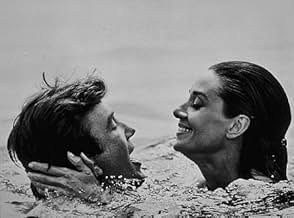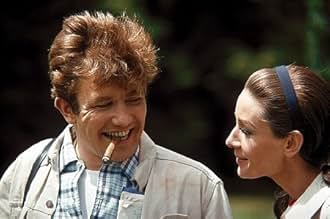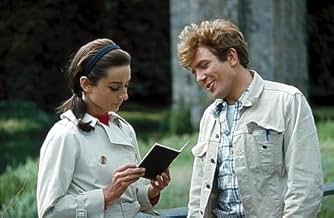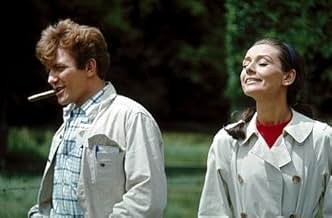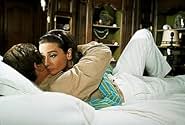NOTE IMDb
7,4/10
15 k
MA NOTE
Un couple marié depuis dix ans dans le sud de la France dérape sur les routes de l'infidélité dans le sud de la France.Un couple marié depuis dix ans dans le sud de la France dérape sur les routes de l'infidélité dans le sud de la France.Un couple marié depuis dix ans dans le sud de la France dérape sur les routes de l'infidélité dans le sud de la France.
- Réalisation
- Scénario
- Casting principal
- Nommé pour 1 Oscar
- 3 victoires et 7 nominations au total
Georges Descrières
- David
- (as Georges Descrieres)
Irène Hilda
- Yvonne de Florac
- (as Irene Hilda)
Karyn Balm
- Simone
- (non crédité)
Yves Barsacq
- Police Inspector
- (non crédité)
Kathy Chelimsky
- Caroline Wallace
- (non crédité)
Roger Dann
- Gilbert, 'Comte de Florac'
- (non crédité)
Olga Georges-Picot
- Joanna's Touring Friend
- (non crédité)
Clarissa Hillel
- Joanna's Touring Friend
- (non crédité)
Avis à la une
In 1967, Audrey Hepburn had gotten into the "swing" of things by being with Peter O'Toole in "How to steal a million" and did not want to go back to being in flops like "paris when it sizzles" or wearing the same old Givenchy clothes. In this film you see a change in her, a new haircut, clothes from the grooviest designers of Mod London and elsewhere like Mary Quant and Paco Rabanne, you see her eat! eating casually bread, grapes;making funny noises,etc. you actually see her having fun in this picture.She plays Joanna Wallace who with her husband played beautifully by Albert Finney reflect on the good times and the bad times of their twelve-year marriage.This film is must see because it goes beyond the happy ending and into actually imitating life where marriage is not always perfect. where marriage has fights and arguments and sometimes infidelity and hurt but love usually conquers all.must see.
5/6/18. Somewhat disappointing. And, it was because the marriage between Hepburn and Finney made very little sense to begin with What kind of a man would make a woman (Hepburn no less) push a car filled will luggage and idiotic Finney in it?? Sadly the scenery could not make up for the terrible marriage and this hardly "romantic" movie.
Thank God that Audrey Hepburn made this film before slipping off into an extended temporary retirement. Was she too old for this movie? Not for the segments that deal with the latter part of the married relationship. The movie spans eleven years and, yes, it is a bit of a visual stretch to see a 37 year old Audrey portraying a 22 year old college woman, but her performance throughout was nothing short of brilliant. This film was a tremendous departure for her. In Two for the Road she does not play the part of the doe-eyed delicate creature of her earlier movies. She even abandoned, reluctantly, her trademark Givenchy wardrobe to sink her teeth into a gritty, visceral part. Many critics of the time remarked on its art house appeal, due in large part to the back and forth sequence editing and the clever juxtaposition of similarities, parallels and contrasts in scenes spanning eleven years. The film must have been incredibly fresh and jarring in its day, abandoning a linear narrative approach to the history of a marriage. Even today it comes across as very "contemporary." Albert Finney delivers an equally strong performance. There is genuine chemistry between Finney and Hepburn. The viewer sees all that is wonderful and horrible about the dynamics of a couple that comes to realize that despite mutual infidelity they still love each other and belong to one another.
This is my favorite movie of all time. I just saw it 2 weeks ago, and I've already watched it about 7 times. The way that Mark and Joanna's relationship is displayed through the time changes is excellent, and while you'd think that keeping track of the time would be difficult, it's actually quite simple if you look at the hair and the attitudes of the couple. Audrey Hepburn is magnificent, one of her best performances ever, and Albert Finney is charming as her workaholic husband. The Maxwell-Manchesters are hilarious, especially the little girl Ruthie. Audrey is the bored wife, trying to save the 12-year marriage, while Albert is the overworking, bad tempered husband. The movie takes you through their three trips, the first when their love affair began, the second when she is pregnant with their first child, and the third when their marriage is beginning to fail. Their love is displayed wonderfully, and anyone can see that Hepburn and Finney were in love in real life, too. The music is beautiful, I love how it's played all throughout the movie. I think that it's one of the best parts of the whole movie, but there wasn't a moment when I wasn't completely wrapped up in what was going on. This is a classic, and I can't believe I'd never heard of it before I accidently picked it up at the video store. Anyone who is married (or who's looking for some laughs) should definitely watch this movie, it's a must-see.
I read in Danny Peary's "A Guide for the Film Fanatic" that some people have formed a strong emotional attachment to this 1967 film. I am one of them. From the opening notes of Henry Mancini's evocative score (personally I think it's his best work) to the end where the main characters drive off into Italy after some verbal sparring, this movie still provides the same pleasure it did when I first saw it on TV in the early seventies. "Two for the Road" is a time capsule of Carnaby Street fashion and French new wave scene juxtaposition, but it remains timeless in its emotionally piercing view of marriage and in the beguiling presence of Audrey Hepburn. There will unlikely be an actress with more style or grace on screen, and never has she seemed more sexy, playful or innately human. It's a shame she never played a role as rich in texture as Frederic Raphael's script provides here. His dialogue is sharp and insightful, as he has the main characters often repeat one another for the sake of getting a different meaning from the same line of dialogue.
As Joanna and Mark Wallace, Hepburn and Albert Finney get to live out more than a decade in their characters' lives from initial meeting to near-divorce. What makes the evolution more impressive is that the story is not a linear narrative but rather a series of five road trips that volley the viewer back and forth in the relationship. Finney provides a formidable match for Hepburn, and he plays with the right mix of roguish insouciance and insecure ambition that doesn't make his character always likable but certainly believable. Their chemistry is palpable, especially in the early days of their courtship as the movie makes hitchhiking the most romantic of adventures with the couple cutting through the entirety of France in various vehicles in record time. Only in the movies. The episode with the pretentious American tourist couple and their bratty daughter provides some biting and funny moments...ironically, the actress portraying the wife, Eleanor Bron, is British. Not surprising that this movie was not such a huge hit stateside since the four Americans in the movie are portrayed in such an unflattering light.
Regardless, credit needs to go to director Stanley Donen (himself an American), who somehow pulls all these disparate elements together and uses his extensive Hollywood experience to bring a nice glossy sheen to the whole film. His third collaboration with Hepburn (after "Funny Face" and "Charade") really turns into a tribute to her as she makes a remarkable transformation from naïve choirgirl to jaded jet-set housewife that goes well beyond the changing hairstyles and clothing. This is one to treasure.
This wondrous film has been lovingly restored for its much-delayed DVD release. The print quality has been significantly improved over the VHS tape I've had for over a decade. A nice bonus feature is a split-screen before-and-after short that shows the visual improvement. Best of all, there is finally an audio commentary track to accompany the film, and Donen provides illuminating insight on the elliptical narrative structure and the non-chronological juxtaposition of the scenes. He explains that the characters are reliving their memories by association with the feelings they are having in the present. His adoration of Hepburn is pervasive and understandable, as he claims rightfully that this was her best performance (they worked together three times). I just wish Finney was available to add his perspective. Moreover, if you ever wondered why the young Jacqueline Bisset's voice doesn't sound like her at all, he admits she was re-dubbed by another actress due to the blaring noise of generators during the location shooting. She apparently had already moved on to shoot her first Hollywood film. For those like me who adore this film, the DVD is a must-buy.
As Joanna and Mark Wallace, Hepburn and Albert Finney get to live out more than a decade in their characters' lives from initial meeting to near-divorce. What makes the evolution more impressive is that the story is not a linear narrative but rather a series of five road trips that volley the viewer back and forth in the relationship. Finney provides a formidable match for Hepburn, and he plays with the right mix of roguish insouciance and insecure ambition that doesn't make his character always likable but certainly believable. Their chemistry is palpable, especially in the early days of their courtship as the movie makes hitchhiking the most romantic of adventures with the couple cutting through the entirety of France in various vehicles in record time. Only in the movies. The episode with the pretentious American tourist couple and their bratty daughter provides some biting and funny moments...ironically, the actress portraying the wife, Eleanor Bron, is British. Not surprising that this movie was not such a huge hit stateside since the four Americans in the movie are portrayed in such an unflattering light.
Regardless, credit needs to go to director Stanley Donen (himself an American), who somehow pulls all these disparate elements together and uses his extensive Hollywood experience to bring a nice glossy sheen to the whole film. His third collaboration with Hepburn (after "Funny Face" and "Charade") really turns into a tribute to her as she makes a remarkable transformation from naïve choirgirl to jaded jet-set housewife that goes well beyond the changing hairstyles and clothing. This is one to treasure.
This wondrous film has been lovingly restored for its much-delayed DVD release. The print quality has been significantly improved over the VHS tape I've had for over a decade. A nice bonus feature is a split-screen before-and-after short that shows the visual improvement. Best of all, there is finally an audio commentary track to accompany the film, and Donen provides illuminating insight on the elliptical narrative structure and the non-chronological juxtaposition of the scenes. He explains that the characters are reliving their memories by association with the feelings they are having in the present. His adoration of Hepburn is pervasive and understandable, as he claims rightfully that this was her best performance (they worked together three times). I just wish Finney was available to add his perspective. Moreover, if you ever wondered why the young Jacqueline Bisset's voice doesn't sound like her at all, he admits she was re-dubbed by another actress due to the blaring noise of generators during the location shooting. She apparently had already moved on to shoot her first Hollywood film. For those like me who adore this film, the DVD is a must-buy.
Le saviez-vous
- AnecdotesHenry Mancini said that although the scoring was the most difficult in his career, the music he composed for this movie was always his favorite.
- GaffesWhile riding in a limousine, Joanna's hairdo is first shown with bangs, then without bangs, and then with bangs again.
- Citations
Mark Wallace: Do you know what marriage is?
Joanna Wallace: Hmm, you tell me, and see if we're thinking of the same thing.
Mark Wallace: Marriage is when the woman tells the man to take off his pajamas... and it's because, she wants to send them to the laundry.
- ConnexionsFeatured in Film Review: Peter Cook, Dudley Moore & Stanley Donen (1967)
Meilleurs choix
Connectez-vous pour évaluer et suivre la liste de favoris afin de recevoir des recommandations personnalisées
- How long is Two for the Road?Alimenté par Alexa
Détails
Box-office
- Budget
- 4 000 000 $US (estimé)
- Montant brut mondial
- 17 808 $US
- Durée1 heure 51 minutes
- Rapport de forme
- 2.35 : 1
Contribuer à cette page
Suggérer une modification ou ajouter du contenu manquant

Lacune principale
By what name was Voyage à deux (1967) officially released in India in English?
Répondre


